广州版小学英语上册短语及句型总汇
广州版小学英语六年级上短语、句型汇总

walk to school走路上学 on the bus在公共汽车上
take a bus乘公共汽车 quiet life安静的生活
1.---When he was in England, Ben lived in a small village in the countryside. 当他在英国时,Ben住在农村的一个小村庄里。
2.---I’m sorry to hear that.听到这个(消息),我很难过。
Unit 6 The secret to good health.
secret to good health健康的秘秘诀 feel good感觉良好
things to stay healthy保持健康的东西
plenty of sleep足够的睡眠 walk for one hour走路一小时
Unit 2 A country life is a healthy life.
on a small farm在一个小农场 in the country在农村
milk the cow挤牛奶 ride a bike骑自行车
get home回到家 much work to do很多工作要做
feel tired觉得疲倦 a healthy life一种健康生活
Unit 8 A trip to Hong Kong
last weekend上个周末 go on a trip去旅行
by train乘火车 his first visit to他第一次去---的旅行
take us to带我们去-- lots of different games许多不同的游戏
eat a little too much吃得有点太多 go shopping去购物
广州版小学五年级英语上册1-12单元知识点归纳与习题

广州最新版小学五年级英语上册1-12单元知识点归纳与习题-CAL-FENGHAI.-(YICAI)-Company One1Module 1 HobbiesUnit 1 What’s your hobby?一、兴趣爱好的词组:play computer games, play music, collect stamps, keep pets, make model ships, read books, take photos, make cakes, plant trees, grow flowers, study plants, listening to music, singing, dancing, drawing, play the piano, play chess,play basketball…二、句型:1. What’s your hobby?2. Do you like… Yes, I do. / No, I don’t.3. I love/like…4. I enjoy …5. My (favourite) hobby is …6. …is my (favourite) hobby.7. Is your hobby keeping pets? Yes, it’s. / No, it isn’t.三、重点精析:1. love/like/enjoy doing sth 喜欢做某事如:I like listening to music. 我喜欢听音乐。
他喜欢集邮。
_____________________________________2. My hobby is doing sth 我的爱好是……如:My hobby is reading books. 我的爱好是看书。
我爸爸的爱好是拍照。
___________________________________3. more than… 多于…… , 超过…… from 来自于如:I have collected more than 3 hundred stamps from 20 countries.我已收集了来自二十个国家的300多张邮票。
广州版小学英语三至六年级词组
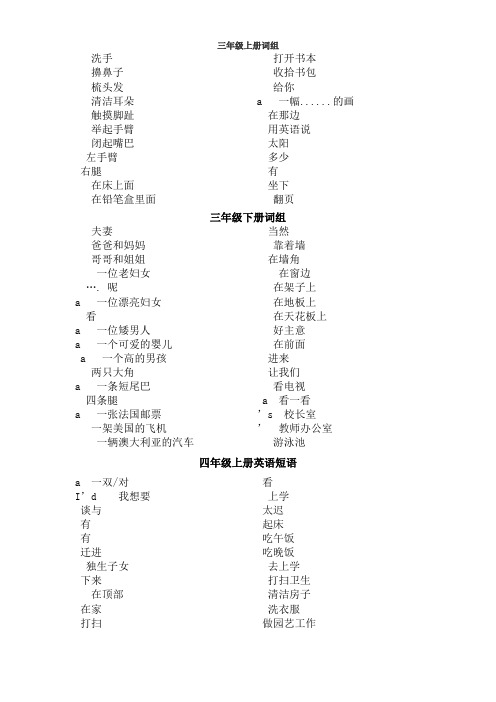
三年级上册词组洗手擤鼻子梳头发清洁耳朵触摸脚趾举起手臂闭起嘴巴左手臂右腿在床上面在铅笔盒里面打开书本收拾书包给你a 一幅......的画在那边用英语说太阳多少有坐下翻页三年级下册词组夫妻爸爸和妈妈哥哥和姐姐一位老妇女…. 呢a 一位漂亮妇女看a 一位矮男人a 一个可爱的婴儿a 一个高的男孩两只大角a 一条短尾巴四条腿a 一张法国邮票一架美国的飞机一辆澳大利亚的汽车当然靠着墙在墙角在窗边在架子上在地板上在天花板上好主意在前面进来让我们看电视a 看一看’s 校长室’ 教师办公室游泳池四年级上册英语短语a 一双/对I’d 我想要谈与有有迁进独生子女下来在顶部在家打扫看上学太迟起床吃午饭吃晚饭去上学打扫卫生清洁房子洗衣服做园艺工作打篮球踢足球喂养宠物a 做一日三餐打乒乓球玩牌打羽毛球下棋玩游戏a 玩得开心洗小汽车去购物去游泳做家务…做作业看电视起火出来吃早餐回家四年级下册短语(s) 岁电脑游戏吹灭聚会游戏玩得开心在外面赶上加油乐器跌倒跳高跳远乒乓球擅长做得好奥运会打开米粉白菜主吃冰淇淋假日照片球类游戏则年青非常老人看电视生日快乐好朋友好朋友弹吉它 , 校服好主意 , 讲故事… 看……… 听……..踢足球打篮球打羽毛球打乒乓球吃早餐吃午餐吃晚餐橙汁苹果汁a … 一片…..a … 一碗….a … 一瓶…..a … 一杯……a .. 一碟…..a … 一杯……a … 一盒…..a … 一袋炒饭煎蛋炒面当然没问题烤牛肉串白菜汤西红柿汤a 一斤看起来好的晚餐吃…..早餐吃…….午餐吃…..别的… 需五年级上册词组1.在十二点三十分2.在十一点五十分之前3.在伦敦4.做面条5.去购物6.在周末7.今天晚上8.每个早上9.在下午10.晚饭后11.吃午饭 /12.读点书13.回家14.少年宫’s15.经常 ()16.参观博物馆17.上网18.去工作(上班)19.去散步 a20.锻炼身体21.下课后22.多经常…… ...?23.A不同于B A B1.第一个学期2.学年3.在冬季学期4.在十一月5.在八月开始6.在二月结束7.在秋季8.最喜欢春季9.度假(’s)10.儿童节’s11.新年;元旦12.元旦’s13.中国的新年;春节14.教师节’15.五一劳动节16.建军节17.国庆节18.在九月十日19.十月三十一日20.跳得很高21.游得快22.每个人都有他自己的天赋23.爬树24.飞得高25.读和写五年级上册词组21.说英语2.和我们谈话 (用宾格)3.用我的腿走路4.用我的手工作5.用英语说故事6.跳舞跳得很好 (不用)7.看我! !8.阅读英语故事9.明白你的老师10.用英语给你的朋友 a11.(球踢得)非常好( )12.相当好13.不是很好14.一点也不15.去花展16.和你一起去17.照相 / a18.在草地上19.休息一会儿 a 20.你当然可以21.那本关于植物的书22.淋花23.种树 ( 少见,别用)24.种花25.摘(那些)花 ()26.排队27.把我的书包留在这28.需要你的笔记本29.英雄树30.广州市市花31.在春天生长32.可爱的紫罗兰1.把它们留在公园2.散步 a3.在长凳上睡觉4.看起来像(s)5.准备,打算6.你将’7.不允许;不应该’8.到达那里9.坐飞机旅游10.坐地铁11.骑自行车去12.七点半 (用逆读法)13.步行14.第二天下午15.和我的祖母在一起16.住在我家附近17.差一刻到十点a18.出发前往;离开去19.在北京20.香江动物园21.呆在深圳22.世界之窗23.一日游 a24.广州美术博物馆25.到家26.之后27.呆在家里28.夜间动物园29.购物中心30.在北京路五年级上册词组31.明天见 .2.北极熊3.和我的家人去动物园4.在动物园门口5.别忘记’t !6.别迟到’t !7.不要乱扔杂物’t .8.不要喂食物给动物’t .9.不要向猴子扔东西’t .10.不要在这里拍照’t .11.不要在草地上散步’t .12.不要把你的香蕉给他们’t .13.为什么不?14.动物园规则15.走得太近16.来自非洲17.谁知道?18.北极19.南极20.北美洲21.南美洲1.广州动物园2.拐左(右) ()3.一直往前走 () /4.在左(右)边 ()5.顺便问一问6.坐十路公交车 a .107.警察局8.电视台9.邮局10.火车站11.不用谢。
广州版小学英语五年级上词汇短语

⼴州版⼩学英语五年级上词汇短语⼴州版⼩学英语五年级上词汇短语Module 1词组:go to work 开始⼯作、着⼿⼯作go to school 去上学go shopping 去购物get up 起床do some reading 看书surf the Net ⽹上冲浪go for a walk 散步take exercise 做运动、做健⾝运动after class 下课后wear glasses 戴眼镜play chess 下棋fall asleep ⼊睡、睡着句型:----How are you?---How often do you play football?----I play football every weekend.----I’m fine, thank you.拓展:how many 多少how much 多少How about(如何,怎么样)how old 多⼤Module 2短语:faster than ⽐……快stand by 站在……旁边both of ⼆者都……very well 很好from morning till night 从早到晚all right 好的,可以of course 当然,⾃然take photos 拍照take a rest 休息⼀会⼉句型:1、I can jump and I can swim.这是含有情态动词can的并列句,由and连接,连接的两部分结构相同。
此句还可以写成:I can jump and swim.Can 表⽰能⼒:“能,会,可以”它没有⼈称和数的变化,它后⾯必须跟动词原型。
can (能、会)can not = can’t (不能、不会)如:The birds can fly. The cats can’t fly.1、I can make a snowmanI can’t swim in the sea.2、Everyone has his own gift. 每个⼈都有⾃⼰的天赋。
新编广州版小学英语六年级上册重点短语和重点句型
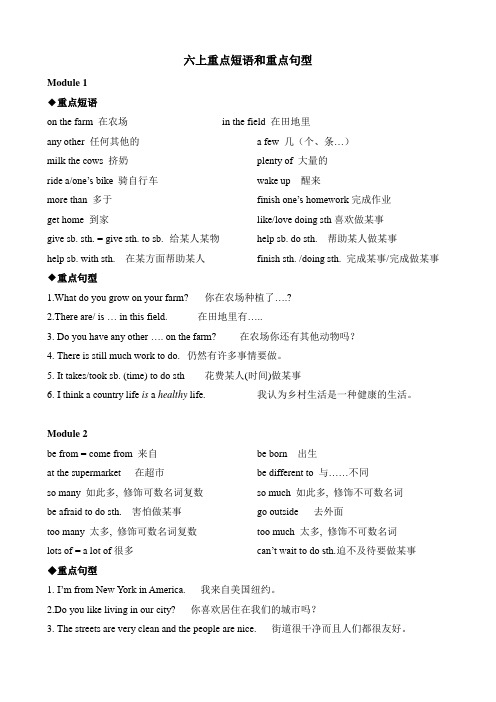
六上重点短语和重点句型Module 1◆重点短语on the farm 在农场in the field 在田地里any other 任何其他的 a few 几(个、条…)milk the cows 挤奶plenty of 大量的ride a/one’s bike 骑自行车wake up 醒来more than 多于finish one’s homewor k完成作业get home 到家like/love doing sth喜欢做某事give sb. sth. = give sth. to sb. 给某人某物help sb. do sth. 帮助某人做某事help sb. with sth. 在某方面帮助某人finish sth. /doing sth. 完成某事/完成做某事◆重点句型1.What do you grow on your farm? 你在农场种植了….?2.There are/ is … in this field. 在田地里有…..3. Do you have any other …. on the farm? 在农场你还有其他动物吗?4. There is still much work to do. 仍然有许多事情要做。
5. It takes/took sb. (time) to do sth 花费某人(时间)做某事6. I think a country life is a healthy life. 我认为乡村生活是一种健康的生活。
Module 2be from = come from 来自be born 出生at the supermarket 在超市be different to 与……不同so many 如此多, 修饰可数名词复数so much 如此多, 修饰不可数名词be afraid to do sth. 害怕做某事go outside 去外面too many 太多, 修饰可数名词复数too much 太多, 修饰不可数名词lots of = a lot of很多can’t wait to do sth.迫不及待要做某事◆重点句型1. I’m from New York in America. 我来自美国纽约。
新广州版小学英语六年级上册短语、句型汇总(默写版和答案版)

新广州版小学英语六年级上册短语、句型汇总(默写版和答案版)Unit 1 What are those farmers doing?短语____________________________在农场里____________________________在田里____________________________一些鹅____________________________喂鸡____________________________种花句子1.---______________________________________________________ __XXX,你在农场里种些什么?__________________________________________________ ______我经常种些花。
2.---______________________________________________________ __那些农民正在做什么?__________________________________________________ ______.他们正在割草喂植物。
3.---______________________________________________________ __Yes。
I do.在农场里你还有其他的动物吗?--是的,我有。
Unit 2 A country life is a XXX.短语____________________________在一个小农场____________________________挤牛奶____________________________回到家____________________________觉得疲倦句子1.---______________________________________________________ __.我喜欢住在农村里,但我经常很忙。
新版广州版六年级英语上册重点短语
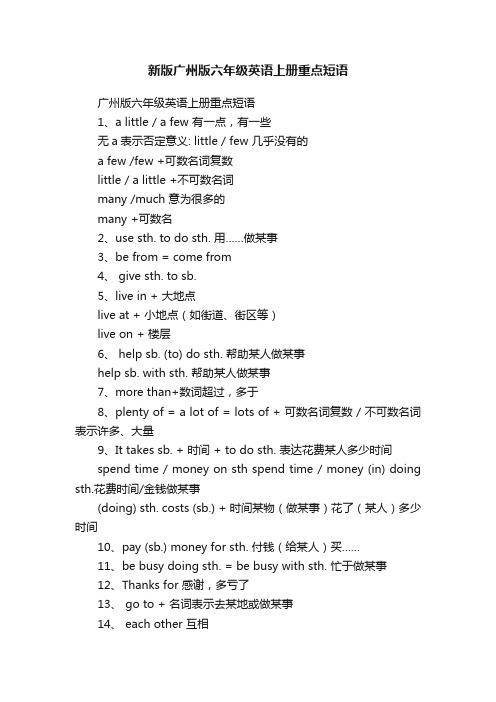
新版广州版六年级英语上册重点短语广州版六年级英语上册重点短语1、a little / a few 有一点,有一些无a表示否定意义: little / few 几乎没有的a few /few +可数名词复数little / a little +不可数名词many /much 意为很多的many +可数名2、use sth. to do sth. 用……做某事3、be from = come from4、 give sth. to sb.5、live in + 大地点live at + 小地点(如街道、街区等)live on + 楼层6、 help sb. (to) do sth. 帮助某人做某事help sb. with sth. 帮助某人做某事7、more than+数词超过,多于8、plenty of = a lot of = lots of + 可数名词复数 / 不可数名词表示许多、大量9、It takes sb. + 时间 + to do sth. 表达花费某人多少时间spend time / money on sth spend time / money (in) doing sth.花费时间/金钱做某事(doing) sth. costs (sb.) + 时间某物(做某事)花了(某人)多少时间10、pay (sb.) money for sth. 付钱(给某人)买……11、be busy doing sth. = be busy with sth. 忙于做某事12、Thanks for 感谢,多亏了13、 go to + 名词表示去某地或做某事14、 each other 互相15、play with + 名词玩耍……;和……玩16、be interesting in sth. / doing sth. 对某事/做某事感兴趣17、 be afraid for 害怕……18、be afraid to do …害怕做……19、too many 太多(+可数)too much +(不可数)much too +形容词/副词修饰程度20、be different to 和……不同/the same as 和……一样21、hear of 知道hear about 听说hear from 收到……来信22、once 一次twice 两次three times 三次four times 四次23、“have a + 疾病名词”表示“患某种疾病”。
广州 新版 三四五年级上册单词 短语 句型

广州新版三四五年级上册单词短语句型广州新版三四五年级上册单词短语句型三年级第一册unit1hello!词汇早上好,女士hello喂;你好你好你好;再见妈妈(儿童语言)下午下午晚上句型你好。
你好,你好。
你好3--早上好。
早上好。
--goodmorning.早上好5--晚上好。
晚上好。
--goodevening.晚上好。
第二单元你好吗?词汇爸爸(儿童语言)是you你;你们你好吗?你好吗晚安,爷爷;爷爷奶奶;祖母句型1.——你好吗?你好吗,很好。
好啊2.——晚安。
晚安。
--goodnight.晚安。
你好!goodmorningmshellohi再见下午2.--hi.你好。
--hi.你好。
下午好。
下午好,下午好。
下午好6--再见。
再见,再见再见再见unit2howareyou?达达雷尤howareyou?finenightgrandpagrandma第三单元你叫什么名字?词汇我am是i'm=iam我是what什么is是what's=whatis.......什么是你的;你的my我的name姓名let让us我们let's=letus让我们;我们……吧be是friend朋友let'sbefriends.让我们成为朋友吧。
短语1.你的名字你的名字3.befriends成为朋友句型1.——怎么了syourname?你叫什么名字?--mynameisaki.我的名字叫aki。
2.--let’sbefriends.--好的。
让我们做朋友吧。
好吧。
第四单元这个节日词汇这位老师很好meet遇见;相遇很高兴见到你。
很高兴见到你,先生unit3what'syourname?国际机械师协会i'm=iamwhatis这是什么。
你的名字let's=letusbefriend让我们去看电影吧。
2.myname我的名字第四单元这个节日thisteachernicemeet很高兴见到你。
广州版小学英语每单元要点

Module 1 ClothesUnit 1 Blouses and jeans 一、单词双基(四会35个,三会7个)11. I’d like = I would like 我想要四、知识点Dialogue:A)Shop assistant: Good morning, Can I help you?Woman: Y es, please, I’d like to buy that blouse. How much is it ?Shop assistant: It’s ninety yuan.Women: OK, I’ll take it .B)Count from 1 to 100, then do the sums in groups.What’s ten and twenty?T en and twenty is thirty.Sixty and fifteen is ________? Thirty and eighteen is ____________?C)Play the game.He is wearing a blue T-shirt, a pair of white socks and a pair of grey sport shoes.Who is he?Unit 2 Shirts,Dresses and Trousers一、单词双基(四会4个,三会3个)二、短语双基四、知识点Dialouge:A) Shop assistant: Good morning, sir. Can I help you?/ What can I do for you?Man : I’d like to buy that blue shirt. / I’d like to buy a black dress. Do you have any ?Shop assistant: Yes, sir. Here you are.Man: How much is it ?Shop assistant: Forty-five yuan.Man: All right, I’ll take it. / OK, / That’s all right. I’ll take it .Shop assistant: Here you are , Thank you.B) Whose T-shirt is it?It’s Xiaoling’s.D)Mother: Look! There’s a strange animal.Ann: No, it’s not. It’s a little man.Fanther: But it’s got two noses and three eyes.Ann: It must be from space ,Look, there’s a spaceship.Alien: Hello. My name’s Billy.Father: Hello, Billy.Mother: Why are you wearing your clothes like that?Alien: what do you mean?Father: Y ou’re wearing gloves on your ears.Alien: Is that wrong?Son: Yes, we wear gloves on our hands. And you’re wearing shoes on your hands. Why?Alien: Is that wrong?Son: Yes, we wear gloves on our hands. And you’re wearing shoes on your hands. Why?Alien: My hands are cold.Ann: But we wear shoes on our feet.Alien: I want to wear clothes as you do .Mother: OK, We’ll help you.MODULE 2 PEOPLEWhat do these people look like?UNIT4 Friends二、短语双基四、知识点DialougeA)Tomoko: Who’s that ?Mr Chen: Which one?Tomoko: The boy over there.Mr Chen: Y ou mean that short boy with a black cap?Tomoko: No, he’s not short and he’s not wearing a black cap. He’s wearing a yellow T-shirt and a brown hat. And he’s wearing a pair of black-and –white sport shoes.Mr Chen: Oh, that’s an American boy . His name’s Mike. He’s my friend.B)FingerThumb \ pointer finger \ middle finger \ ring finger \ little fingerC)Hans comes from Germany. He is tall and has long arms and legs. He has a square face, bigeyes, a small nose and a big mouth. He’s wearing an orange shirt and a pair of brown trousers.He’s wearing a brown cap and a pair of black sunglasses. His shoes are black._______________________________________________________________________________UNIT 5 Our Heroes And Heroines一、单词双基(四会12个,三会13个)四、知识点Story Time:Rabbit: Y ou’re small, ugly and slow! Ha-ha-ha!Tortoise: Well, Mr Rabbit. Let’s have a race.Let’s see who gets first to the house over there, you or me.Rabbit and Tortoise: Ready , go!Rabbit: Y ou are so slow!Rabbit: Well, I am fast and I am winning! I can take a break.Tortoise: I’m slow. I can’t stop!Tortoise: I am the winner!Rabbit: Oh, no! I am the slow one.Module 3 OccupationsWhat do you want to be when you grow up?Unit7 Our Future Jobs一、单词双基(四会15个,三会8个)4. Do you want to be a bank manager when you grow up?Unit 8 My Parents’ job 一、单词双基(三会7个)二、短语双基Module 4 People Who Help UsWho can help us?Unit 10 My New Neighbour 一、单词双基(四会16个,三会12个)I can catch criminals. 我能抓贼。
广州版小学英语四年级上册总复习
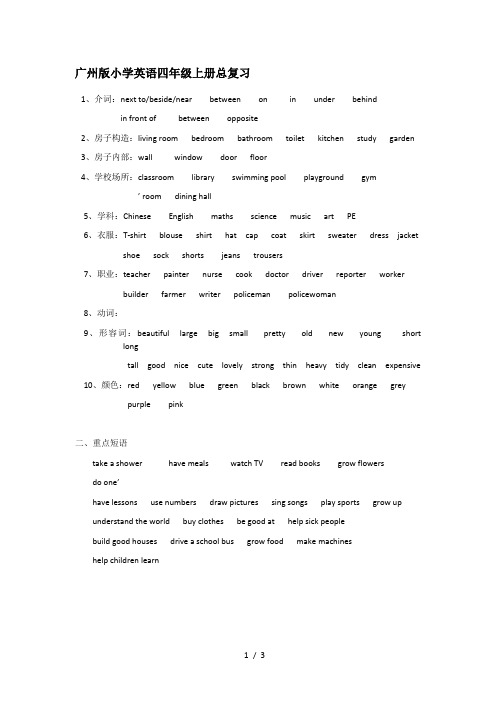
广州版小学英语四年级上册总复习1、介词:next to/beside/near between on in under behindin front of between opposite2、房子构造:living room bedroom bathroom toilet kitchen study garden3、房子内部:wall window door floor4、学校场所:classroom library swimming pool playground gym’ room dining hall5、学科:Chinese English maths science music art PE6、衣服:T-shirt blouse shirt hat cap coat skirt sweater dress jacketshoe sock shorts jeans trousers7、职业:teacher painter nurse cook doctor driver reporter workerbuilder farmer writer policeman policewoman8、动词:9、形容词:beautiful large big small pretty old new young shortlongtall good nice cute lovely strong thin heavy tidy clean expensive 10、颜色:red yellow blue green black brown white orange greypurple pink二、重点短语take a shower have meals watch TV read books grow flowersdo one’have lessons use numbers draw pictures sing songs play sports grow upunderstand the world buy clothes be good at help sick peoplebuild good houses drive a school bus grow food make machineshelp children learn三、按实际情况回答问题1. Do you have your own(自己的)bedroom?2. Is there a study in you house?3. Do you live in a flat or a house?4. How many rooms are there in your house?5. What do you do after school?6. How many children are there in your class?7. Is there a swimming pool in your school?8. Where do you have PE lessons at school?9. Is there a teachers’ room next to your classroom?10. How many desks are there in your classroom?11. How many boys are there in your class?12. What is your favourite fruit?13. Do you play sports at school?14. What subject do you like best? ( What’s your favourite subject?)15. What do you want to be when you grow up?16. What’s your father’s job? ( What’s your mother’s job?)17. Do you want to be a doctor when you grow up?18. What can drivers do?19. Is there a teacher in your family?20. How many subjects do you have?21. What colour is your sweater?22. What is sixteen and fourteen?。
广州版小学英语各年级主要知识点归纳
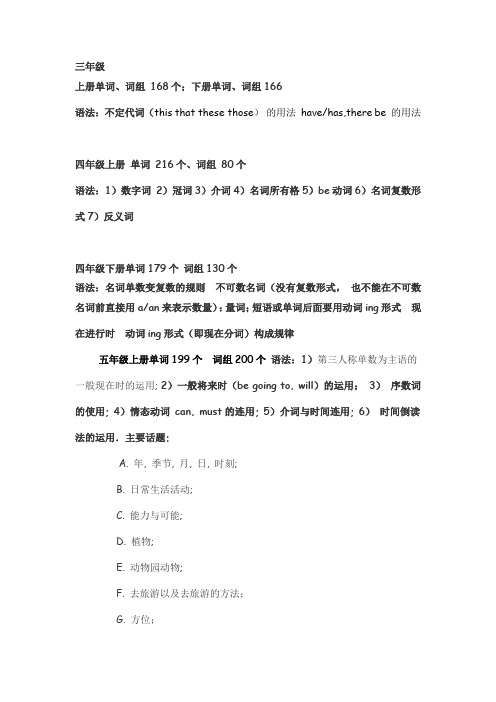
三年级上册单词、词组 168个;下册单词、词组166语法:不定代词(this that these those)的用法have/has,there be 的用法四年级上册单词 216个、词组 80个语法:1)数字词 2)冠词3)介词4)名词所有格5)be动词6)名词复数形式7)反义词四年级下册单词179个词组130个语法:名词单数变复数的规则不可数名词(没有复数形式,也不能在不可数名词前直接用a/an来表示数量):量词;短语或单词后面要用动词ing形式现在进行时动词ing形式(即现在分词)构成规律五年级上册单词199个词组200个语法:1)第三人称单数为主语的一般现在时的运用; 2)一般将来时(be going to, will)的运用; 3)序数词的使用; 4)情态动词 can, must的连用; 5)介词与时间连用; 6)时间倒读法的运用.主要话题:A. 年, 季节, 月, 日, 时刻;B. 日常生活活动;C. 能力与可能;D. 植物;E. 动物园动物;F. 去旅游以及去旅游的方法;G. 方位;H. 问路与应答;I. 规劝与应答五年级下册151个词组125个语法:1)掌握主语为第三人称单数一般现在时的各种句型2)学习和掌握should和shouldn’t的用法3)人称代词和物主代词的用语及正确使用4)形容词、副词的比较级的用法及构成4)I prefer…句型及待客用语的问答5)名词改为形容词的构词方法,如sun— sunny本册书有关于疾病、野生动物、食物等的名词及短语;有关于描述天气特征、人物状态、物体等的形容词还有动词和副词等。
(打电话、看病、询问、量度、用餐、天气)及相关的句型;六年级上册单词107个词组118个六年级下册单词140个词组130个语法:一般过去时;形容词的用法:形容词的比较级变化。
much +比较级;When 引导的时间状语从句--------用when连接前后两个完整的句子;There be句型;宾语从句;时间状语从句;年代的读法;选择疑问句;反意疑问句;连词(and,but,so)的用法;形容物体的形状、颜色、长相等;感叹句的学习;主语+ be 动词+ 形容词;形容词的比较级和最高级;时间表达;情态动词○1can/can’t + 动词原形could/couldn’t + 动词原形○2may/may not + 动词原形○3must/mustn’t + 动词原形(needn’t)Don’t + 动词原形禁止/不允许I hope/wish +句子(can/will/could/动词)我期望……(虚拟)。
广州版三年级上册句型语法归纳
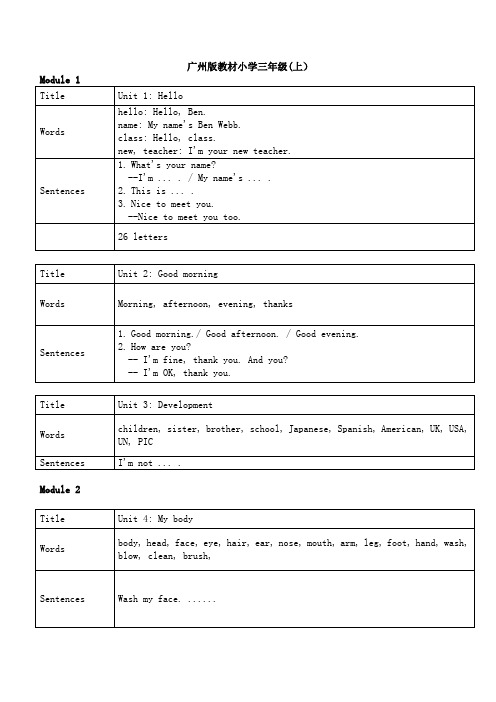
广州版教材小学三年级(上)Module 2Module 3Sentences Open the books. Lend me your ruler. Is ....?Here's... .Grammar 定冠词the的用法:定冠词the与指示代词this,that同源,有"那(这)个"的意思,但较弱,可以和一个名词连用,来表示某个或某些特定的人或东西。
1)特指双方都明白的人或物:Take the medicine. 把药吃了。
2)上文提到过的人或事:He bought a house. I’ve been to the house.他买了幢房子。
我去过那幢房子。
3)指世上独一物二的事物:the sun, the sky, the moon, the earth4)单数名词连用表示一类事物:如:the dollar 美元;the fox 狐狸;或与形容词或分词连用,表示一类人:the rich 富人; the living 生者。
5)用在序数词和形容词最高级,及形容词only, very, same等前面:Where do you live? I live on the second floor. 你住在哪?我住在二层。
That’s the very thing I’ve been looking for. 那正是我要找的东西。
6)与复数名词连用,指整个群体:They are the teachers of this school.指全体教师)They are teachers of this school. (指部分教师)7)表示所有,相当于物主代词,用在表示身体部位的名词前:She caught me by the arm.. 她抓住了我的手臂。
8)用在某些由普通名词构成的国家名称、机关团体、阶级、等专有名词前:the People’s Republic of China 中华人民共和国the United States 美国9)用在表示乐器的名词之前:She plays the piano. 她会弹钢琴。
(完整word版)广州版小学英语六年级上短语、句型汇总(word文档良心出品).doc

广州版小学英语六年级(上)短语和句型汇总短语句型Module 1 Country life Unit 1What are those farmers doing?on the farm 在农场里fruit trees 果树in the field 在田里pick apples 摘苹果some geese一些鹅on the river 在河上feed the chickens 喂鸡feed the pigs 喂猪grow flowers 种花plant trees 种树3.---Do you have any other animals on the farm?--Yes, I do.在农场里你还有其他的动物吗?--是的,我有。
1.---What do you grow on your farm, Uncle Chen?陈叔叔,你在农场里种些什么?---I usually grow flowers.我常常种些花。
2.---What are those farmers doing?那些农民正在做什么?---They are cutting grass to feed the animals.他们正在割草喂动物。
Unit 2 on a small farm 在一个小农场in the country 在农村milk the cow 挤牛奶ride a bike 骑自行车get home 回到家much work to do 很多工作要做feel tired 觉得疲倦 a healthy life 一种健康生活4.---So I think a country life is a healthy life.因此,我认为乡村生活是一种健康的生活。
A country life is a healthy life.1.---I love living in the country, but I ’m usually very busy.我喜欢住在农村里,但我经常很忙。
广州版小学英语各年级主要知识点归纳
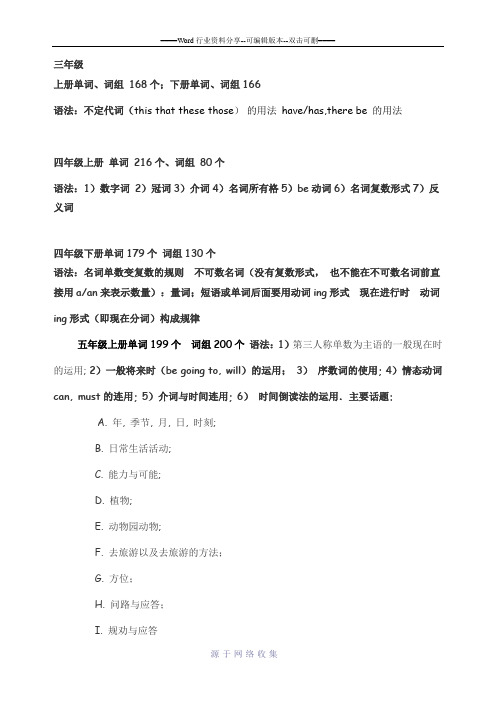
三年级上册单词、词组 168个;下册单词、词组166语法:不定代词(this that these those)的用法have/has,there be 的用法四年级上册单词 216个、词组 80个语法:1)数字词 2)冠词3)介词4)名词所有格5)be动词6)名词复数形式7)反义词四年级下册单词179个词组130个语法:名词单数变复数的规则不可数名词(没有复数形式,也不能在不可数名词前直接用a/an来表示数量):量词;短语或单词后面要用动词ing形式现在进行时动词ing形式(即现在分词)构成规律五年级上册单词199个词组200个语法:1)第三人称单数为主语的一般现在时的运用; 2)一般将来时(be going to, will)的运用; 3)序数词的使用; 4)情态动词can, must的连用; 5)介词与时间连用; 6)时间倒读法的运用.主要话题:A. 年, 季节, 月, 日, 时刻;B. 日常生活活动;C. 能力与可能;D. 植物;E. 动物园动物;F. 去旅游以及去旅游的方法;G. 方位;H. 问路与应答;I. 规劝与应答五年级下册151个词组125个语法:1)掌握主语为第三人称单数一般现在时的各种句型2)学习和掌握should和shouldn’t的用法3)人称代词和物主代词的用语及正确使用4)形容词、副词的比较级的用法及构成4)I prefer…句型及待客用语的问答5)名词改为形容词的构词方法,如sun— sunny本册书有关于疾病、野生动物、食物等的名词及短语;有关于描述天气特征、人物状态、物体等的形容词还有动词和副词等。
(打电话、看病、询问、量度、用餐、天气)及相关的句型;六年级上册单词107个词组118个六年级下册单词140个词组130个语法:一般过去时;形容词的用法:形容词的比较级变化。
much +比较级;When 引导的时间状语从句--------用when连接前后两个完整的句子;There be句型;宾语从句;时间状语从句;年代的读法;选择疑问句;反意疑问句;连词(and,but,so)的用法;形容物体的形状、颜色、长相等;感叹句的学习;主语+ be 动词+ 形容词;形容词的比较级和最高级;时间表达;情态动词○1can/can’t + 动词原形could/couldn’t + 动词原形○2may/may not + 动词原形○3must/mustn’t + 动词原形(needn’t)Don’t + 动词原形禁止/不允许I hope/wish +句子(can/will/could/动词)我期望……(虚拟)。
广州版3年级英语上册重点短语

广州版3年级英语上册重点短语Module 1Good morning.早上好。
Good afternoon.下午好。
Good evening.晚上好。
Goodbye.再见。
How are you?你好吗?Good night.晚安。
Mum and Dad妈妈和爸爸Module 2your name你的名字my name我的名字let's=let us让我们be friends成为朋友this is这是Nice to meet you.见到你很高兴。
my new friend我的新朋友my teacher我的老师primary school小学a funny name一个有趣的名字from space来自太空family name姓given name名字middle name中间名Module 3 wash your face洗脸wash your hands洗手wash your hairs洗头clean your nose清洁鼻子clean your ears清洁耳朵clean your feet清洁脚touch your eyes摸眼睛touch your head摸头touch your nose摸鼻子play a game做游戏in the morning在早上brush my teeth刷牙your turn轮到你了open your eyes睁开眼睛close your eyes闭上眼睛Module 4a picture of 一副······的照片a picture of my family一副我的家庭照my father's father我爷爷my mother's mother我外婆Jimnin's grandma嘉民的奶奶/外婆so young如此年轻thank you谢谢a funny man一个诙谐的男人Module 5Jimnin's dog嘉民的狗a cat一只猫a rabbit一只兔子a kite一个风筝look at看一看in the sky在天空I have我有show me给我看a toy dog一只玩具狗from my grandpa来自我爷爷/外公my toy spaceship我的玩具飞船hoop and stick滚铁圈Module 6Do you have...?你有······吗?use it使用它Here you are.给你。
广州版小学六年级英语上册每单元要点[教材]
![广州版小学六年级英语上册每单元要点[教材]](https://img.taocdn.com/s3/m/ae46d8501611cc7931b765ce0508763231127428.png)
广州版小学六年级英语上册每单元要点[教材] Module 1 PlansUnit 1 What Are We Going to Do for Our Holiday?一、单词双基a lot of 许多...... ?lot 许多 ?clothes 衣服 ?have fun 玩得开心 ?have been to 到过 ?instead 代替 ?plan 计划漫游;游弋 cruise 点心珍珠 dimsum pearl珠江庙 the Pearl River temple六榕寺味道好的;好吃的 the Six Banyan Temple yummy二、短语双基我们大家 1. all of us买新衣服 2. buy new clothes爬白云山 3. climb the Baiyun Hill读书 4. do some reading在广东酒家吃点心 5. eat dimsum at Guangdong restaurant好主意 6. good idea游珠江 7. go on the Pearl River Cruise在下九路购物 8. go shopping in Xiajiu Road广州艺术博物馆 9. Guangzhou Art Museum到过 10. have been to玩得很开心 11. have a lot of fun玩得开心 12. have fun吃午饭 13. have lunch多次 14. many times打牌 15. play cards学校假期 16. school holiday看白老虎 17. see white tiger上网 18. surf the Net照相 19. take photos珠江 20. the Pearl River六榕寺 21. the Six Banyan Temple香江野生动物园 22. Xiangjiang Zoo想要做某事 23. want to do sth.观鸟 24. watch birds写信 25. write a letter三、句型双基你打算干什么, 1. What are you going to do?我打算去爬白云山。
新版广州版小学英语六年级上短语句型汇总

新版广州版小学英语六年级上短语句型汇总在小学英语六年级的学习中,短语和句型的掌握是非常重要的。
通过掌握常用的短语和句型,同学们可以更加流利地表达自己的想法,提高英语口语和写作的能力。
本文将对新版广州版小学英语六年级上册的短语和句型进行汇总和总结,希望对同学们的学习有所帮助。
一、日常用语短语1. How are you? - 你好吗?2. Nice to meet you! - 很高兴见到你!3. What's your name? - 你叫什么名字?4. Where are you from? - 你来自哪里?5. Thank you! - 谢谢你!6. You're welcome! - 不客气!7. Excuse me. - 对不起。
8. May I go to the restroom? - 我可以去洗手间吗?9. Can you help me? - 你可以帮助我吗?10. I'm sorry. - 对不起。
二、时间和日期短语1. What's the time? - 几点了?2. It's eight o'clock. - 现在是八点。
3. What day is it today? - 今天是星期几?4. It's Monday. - 今天是星期一。
5. What's the date today? - 今天几号?6. It's the 5th of May. - 今天是五月五号。
三、询问和告知短语1. Can I help you? - 我能帮你吗?2. What's this in English? - 这个用英语怎么说?3. How do you spell it? - 怎么拼写?4. I don't understand. - 我不懂。
5. Please speak slowly. - 请慢慢说。
- 1、下载文档前请自行甄别文档内容的完整性,平台不提供额外的编辑、内容补充、找答案等附加服务。
- 2、"仅部分预览"的文档,不可在线预览部分如存在完整性等问题,可反馈申请退款(可完整预览的文档不适用该条件!)。
- 3、如文档侵犯您的权益,请联系客服反馈,我们会尽快为您处理(人工客服工作时间:9:00-18:30)。
Module 1 词组:go to work 开始工作、着手工作go to school 去上学go shopping 去购物get up 起床do some reading 看书surf the Net 网上冲浪go for a walk 散步take exercise 做运动、做健身运动after class 下课后wear glasses 戴眼镜play chess 下棋fall asleep 入睡、睡着句型:----How often do you play football? ----How are you?----I play football every weekend. ----I’m fine, thank you.拓展: how many 多少 how much 多少How about(如何,怎么样) how old 多大Module 2短语faster than 比……快 stand by 站在……旁边both of 二者都…… very well 很好from morning till night 从早到晚 all right 好的,可以of course 当然,自然 take photos 拍照take a rest 休息一会儿句型1、I can jump and I can swim. 这是含有情态动词can的并列句,由and连接,连接的两部分结构相同。
此句还可以写成:I can jump and swim.Can 表示能力:“能,会,可以”它没有人称和数的变化,它后面必须跟动词原型。
can (能、会)can not = can’t (不能、不会)如:The birds can fly.The cats can’t fly.I can make a snowmanI can’t swim in the sea.2、Everyone has his own gift.每个人都有自己的天赋。
everyone 表示“每个人,人人”,当其做句子主语时,谓语动词用单数形式,如本句中的谓语动词have就变成了has.everyone与every one 都可以作“人人”解,其区别在于:everyone 是一个词,只用来指人,等于everybody,在它的后面不能跟介词of; every one 是两个词,既可以用来指人,也可用来指物,等于each one,后面可跟介词of.例子:Everyone knows his job.每个人都知道自己该做什么。
Every one of us has shortcomings. 我们每个人都有缺点。
3、What else can you do?你还会做什么?此句为含有情态动词can的特殊疑问句,特殊疑问词为what.句子结构为:特殊疑问句+情态动词(can,would,should,will)+主语+动词原形+其他?例子:What will you do this Sunday?这周日你要做什么?else 意为“其他的,别的”,常用在something,anything,everybody等不定代词和what,who等疑问代词的后面。
例子:I want something else to eat.What else do you want?你还想要什么?4、Watch me!看我的!此句常用于口语中,表示“自己要亲自做事”时常用的句型。
例:Wuu!I can’t find my mum. 呜,我找不到妈妈了。
Watch me! Let me help you! 看我的!让我来帮你!watch 的类似的用法:Watch out!当心呀!Watch it!小心!5、How well can you dance?你跳舞跳得怎么样? how表示“怎样”,为疑问副词。
类似的用法还有:How old are you?你年纪多大了?How far is it from Guangzhou to Beijing?从广州到北京有多远?How many boys are there in your class?你们班有多少个男生?How much is the computer?这台电脑多少钱?Module 3词组:line up 排队 an oak tree 一棵橡树the Hero Tree 英雄树 pick flowers 摘花ride a bike 骑自行车 climb trees 爬树take a walk 散步 sit on the grass 坐在草地上sleep on the bench 睡在长椅上 listen to the radio 收听录音机do some reading 阅读 take good care of 好好照顾……hold the earth and water 保持水土 dig holes 挖洞walk dogs 遛狗句型:1.Let’s ……“让我们……吧!”Let’s 后面必须接动词原形,没有任何词的变化。
如:Let’s go to the flower show. 我们去看花展吧。
Let’s go shopping tomorrow. 我们明天去购物吧!Let’s have a look.Let’s take a taxi.2.Can I go with you?我可以和你们一起去吗?情态动词can 在这里表允许,基本意思是“能,会,可以”。
can 用于疑问句时表请求、允许或询问,用于否定句时表不允许。
例:Can you lend me a hand?你能帮我一把吗?Can you dance?你会跳舞吗?Father says I can’t swim in the river.爸爸说我不能在河里游泳。
You can’t go to Beijing alone.你不能一个人去北京。
3.Sure!当然!这是一句口语,在英语中极为常用,相当于“Yes!”,“of course!”,“Certainly!”。
常用语回答一般疑问句,意为“当然,的确”。
例:1.-Can I take photos of these flowers?我可以给这些花照相吗?-Sure!当然!2.-Are you coming with us?你和我们一起去吗?-Sure!当然!4. What are you doing there?你在那里做什么?此句时态是现在进行时。
现在进行时的结构是:be动词(am/is/are)+动词的现在分词(动词原形+ing)例:-What are you doing here,little boy?小朋友,你在那里做什么?-I’m waiting for my mother.我在等我的妈妈。
现在进行时还可以表示以下情况:(1)表目前情况。
I’m not sleeping well. I want to take a holiday.近日我睡眠不好,我想休假。
(2)用于描写一种延续的持续进行的状态。
I am missing you dreadfully. 我非常想念你。
(3)表示将要发生的动作(仅限于一些表示移动词:go,come,leave,start等)I’m going.我要走了。
I’m leaving tomorrow.我明天就要走了。
5. Are you ready?你准备好了吗?这是口语中极为常见的句子,广泛用于生活中的各个场景,用来询问对方是否准备好了。
Can you help us take a photo?你能帮我们照张相吗?Sure!Are you ready?当然!你们准备好了吗?Yes!准备好了!Module 4词组:the start of………的开始 on holiday 度假;在假期on foot 步行 be going to(一般等于will)将做……stay with 留宿,暂住,和……在一起 get to 到达leave for 出发前往……,离开去…… leave…for 离开…去…by plane(by air)乘飞机 Window of the world世界之窗Guangzhou Art Museum 广州艺术博物馆 Xiangjiang Zoo香江野生动物园for a day trip 一日游 stay in 呆在……stay at home 到家 on Monday 在星期一half past seven 7点半 a quarter to ten 10点差一刻/9点45分go home 回家 Night Zoo 夜间动物园shopping centre 购物中心句型:1、How are you going to get there?你打算怎么去那儿。
----By plane/ train/ bus/ car/ bike/ underground/ ship.(On foot)2、Where are you going on holiday? 你打算去哪里度假呢?I am going to Hong Kong.3、What time is your train going to leave for Hong Kong?你们的火车将什么时候开往香港呢?4、When will you get there?你将什么时候到那儿?5、What about Thursday?周四怎么样?What about…?这一句型用于提出建议,意为“……怎么样?”6、What are you going to do on your holiday?你假期打算做什么?(你打算做什么来度过假期)时间表达方式:7:00 seven o’clock 12:05 five past twelve6:15 a quarter past six 8:40 twenty to nine2:30 half past twoModule 5有用的词组:at the gate of the zoo/park/school 在/动物园公园/学校的大门口zoo rule 动物园规则类似 school rulelook like 看起来像wake up 弄醒,叫醒laugh at 嘲笑句型:1.Don’t feed the animals in the zoo!2.Would you like to come to the zoo with me? Yes,thanks. That would be great.3.Why not?为什么不呢?4.Who knows?谁知道呢?这是一句常用口语,意为:谁知道呢?说不定。
5.Where is the lion from?这头狮子来自哪里?这是一个特殊疑问句,用where来提问某物或某人从哪里来。
